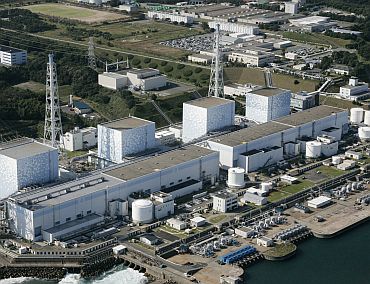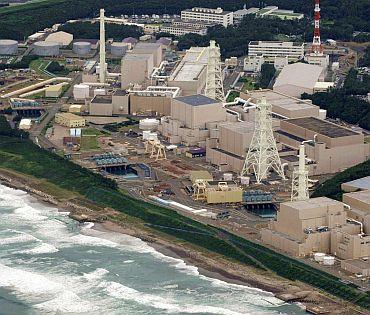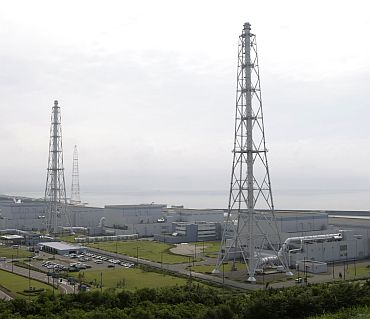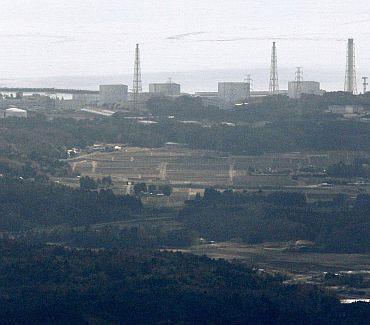A Japanese nuclear power plant exploded on Saturday, triggering a 'nationwide atomic alert' in the country already reeling under the impact of giant tidal waves caused by a massive earthquake which has left 1,700 people dead or unaccounted for.
The main reactor at Fukushima nuclear plant in northern Japan, 250 kilometres north of Tokyo, exploded this afternoon leading to radiation leaks injuring four people as the authorities told 45,000 residents living within a 10-km radius of the leaking plant to evacuate their homes, Kyodo news agency reported.
At least three residents evacuated from a Japanese town near a quake-hit nuclear plant have been exposed to radiation, media reports said. The three were randomly chosen for examination out of some 90 bedridden patients moved from a hospital in the town of Futaba-machi, public broadcaster NHK reported.
"The plant is experiencing a nuclear meltdown," Japanese nuclear scientists confirmed, after Prime Minister Naoto Kan visited the site in a helicopter earlier in the day.
...
Japan scrambles to cool its 5 nuclear reactors
Image: Chubu Electric Power Co's Hamaoka nuclear power plant is pictured in Shizuoka Prefecture August 11Reports said the main building of the plant housing the reactor as well as the outer walls were blown away in the high intensity explosion which occurred at 3.30 pm local time (1200 IST) as the cooling water levels dropped alarmingly through evaporation after the quake had damaged the main plant.
"The loss of cooling water is leading to a meltdown of the reactor," Jiji Press reported.
TV footage showed smoke billowing from the site and reported that the reactor building had been destroyed. The channels and public broadcasters warned nearby residents to turn off air conditioners and not to drink tap water.
People going outside were told to avoid exposing their skins and to cover faces with masks and wet towels. Kyodo quoting police said that another nuclear plant adjacent to the one, which exploded was also malfunctioning with the radiation level reaching almost 1000 times the normal level.
Japan scrambles to cool its 5 nuclear reactors
Image: Tokyo Electric Power Co's Kashiwazaki-Kariwa nuclear power plant is seen in Kashiwazaki in this July 18, 2007 file photoA state of emergency was declared at two reactors at Japan's Daiichi and three units at its nearby Fukushima Daini site, media reports said.
The National Police Agency was quoted by Kyodo as saying that the total number of those died and were unaccounted for in Friday's catastrophic earthquake topped 1,000, as some areas suffered devastating damage mainly due to tsunami waves of up to 33-foot high.
The Daiichi and Daini power plants operated by Tokyo Electric Power experienced critical failures of the backup generators needed to power cooling systems after the plants shut down automatically following the quake.
Japan scrambles to cool its 5 nuclear reactors
Image: Fukushima Nuclear Plant reactor number 1 Daiichi facility is seen in Fukushima Prefecture, northeastern Japan, March 12Some reports said that about 45,000 people were affected by the evacuation order at the Daiichi plant.
Chief Cabinet Secretary Edano said that there was not any immediate threat to people's health.
"We are taking every possible measure" to prevent disastrous developments, he said, while urging caution in the wake of strong aftershocks that jolted the country on Saturday morning.
The agency said the damage caused by Friday's catastrophic earthquake in Japan expanded on Saturday, with the combined number of people who died or are unaccounted for feared to top 1,600.
The Tokyo fire department send specialised "hyper rescue teams" to the exploded nuclear plants.





article